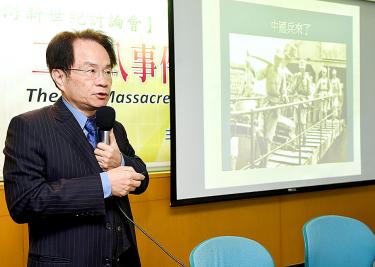Chiang Kai-shek’s (蔣介石) obstinance when dealing with the aftermath of the 228 Massacre played a larger role in sparking the Taiwanese independence movement than the Chinese Nationalist Party’s (KMT) corruption after World War II did, Academia Sinica associate research fellow Chen Yi-shen (陳儀深) said yesterday.
Chen made the remark at a forum hosted by the Taiwan New Century Foundation in Taipei marking the 71st anniversary of the 228 Incident, a bloody crackdown launched by the then-KMT regime against civilian demonstrators following an incident in Taipei on Feb. 27, 1947.
The KMT headquarters had during its Third National Congress passed a resolution to relieve Chen Yi (陳儀) of his duty as Taiwan governor-general in light of his handling of the Incident, Chen Yi-shen said.
Presenting a facsimile of the minutes taken during the congress, he said that Chiang, determined to protect Chen Yi, overruled the resolution, citing an article in the KMT’s charter.
Chiang would later sign off on an order to execute Chen Yi in Taipei in June 1947, after it was found through Chen Yi’s correspondence that he had conspired with the Chinese Communist Party against Chiang, Chen Yi-shen said.
Chiang favored Peng Meng-chi (彭孟緝) — a major-general at the Kaohsiung Garrison who “killed a lot of people in Kaohsiung” — as Chen Yi’s successor, despite former minister of national defense Pai Chung-hsi (白崇禧) and former chief-of-staff Chen Cheng (陳誠) advising against Peng’s appointment.
Peng was the person who referred Chen Yi, helping him become Taiwan governor-general, but instead of being punished, he was promoted, Chen Yi-shen said.
These incidents offer insights into Chiang’s mentality following the massacre and should serve as a reference when determining Chiang’s responsibility for the Incident, he said.
Chiang’s attitude likely played a larger role in sparking the Taiwanese independence movement than people’s initial disillusionment with the KMT government after it took over Taiwan from Japan, he added.
Chen Yi-shen showed a facsimile of one of Chen Yi’s letters to Chiang, which showed that Chen Yi attributed the cause of the Incident to “Japan-backed gentry and hooligans exploiting the ethnocentric ideology of Taiwanese autonomy to instigate terrifying persecution,” before asking Chiang to send troops to crack down on the unrest.
He later in a letter thanked Chiang for swiftly dispatching troops before the situation became “unthinkable,” and suggested that Chiang “modify the thinking of Taiwanese, thereby sinicizing them” by improving Chinese and social-science education, Chen Yi-shen said, drawing a parallel with the abolished “minor revisions” of high-school social-science curriculum guidelines by the KMT which sparked massive student-led protests in 2015 due to its disproportionately large focus on China.
In contrast to Chen Yi’s account, then-Control Yuan member Chiu Nien-tai (丘念台) said in a letter to Chiang that the outbreak was triggered by “corrupt politics” and “suffering industries.”
In the letter, Chiu estimated the number of massacre victims to be “more than several thousand,” which contrasted claims that there were only about 1,000, Chen Yi-shen said, adding that based on records he had studied, the actual number is likely about 20,000.
Meanwhile, Chen Yi-shen urged swift passage of the political data act, as it would complement the Act on Promoting Transitional Justice (促進轉型正義條例) passed in December last year.
Otherwise, it might be difficult to collect documents stowed away in the KMT’s archives or spread throughout society, such as Chiang’s diaries that are kept in the US, he said.
Democratic Progressive Party Legislator Yu Mei-nu (尤美女), who attended the forum, said the roles of the victims and the perpetrators during the authoritarian era could be intertwined, as victims could have also “victimized” others by giving their names during interrogations.
Determining the victims and perpetrators in the quest for transitional justice must be done carefully, Yu said.
The bill for the political data act has been prioritized for review during the current legislative session, she added.
Source: Taipei Times - 2018/02/25





















